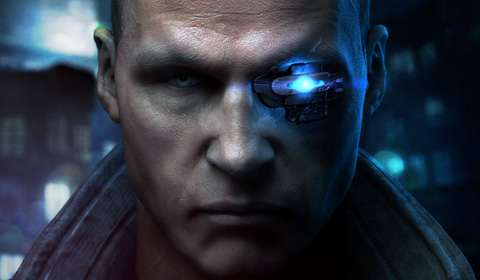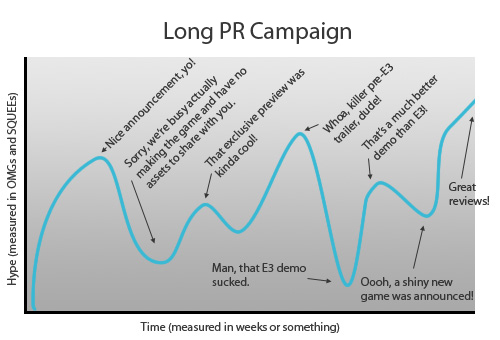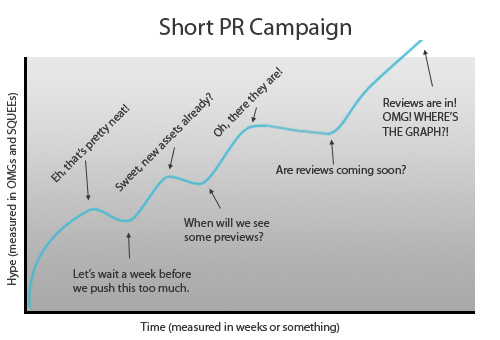We teased it two weeks ago, and now it’s finally a real thing: Flying Wild Hog‘s debut title, Hard Reset, has been announced via an exclusive with PCGamer.com, and there’s a nice interviewy-type thing over at Beefjack.com for those interested in a bit more info. Hit those links to find out more about what sort of game it is, to see the teaser trailer and to check out some screenshots. Those sites do a good job of explaining what we’re ready to explain, and this post is totally unrelated to the content of the game.
The sentiment on forums and in comment threads (and, indeed, in private email exchanges with media) has been largely positive, and one part of the announcement, in particular, has seen a lot of attention: the fact that Hard Reset is scheduled for release in September, just two months away. Surprisingly, the release date-related comments haven’t all been positive. In this industry we’ve become accustomed to one-or-two-year PR/marketing campaigns, and frankly, I’ve been dying for an opportunity like this – to get a client that will let me see what we can do with a much shorter promotional window. Hit the jump to read more.
I promoted Neverwinter Nights for what seemed like an eternity — that game took upwards of three or four years between announcement and release, I think… maybe even eight (sorry, I was in my late teens/early twenties, so I may have been in a bit of a haze back then). Dragon Age came out years after we announced it. The Witcher was another game I worked on for a few years, along with the sequel.
There are all sorts of reasons for dragging a campaign on for a long time: sometimes (mostly) you plan everything for a certain date, only to be hit with a game delay. Sometimes you plan for a long campaign, because the developer recently finished up a project and needs to get back into the spotlight. Other times you just feel like your game warrants an extended bout of “awareness” (I love marketing words!), and you know that media and gamers will be quite happy to enjoy morsels of information spread over a year or two. Maybe you think that you absolutely must hit E3 or GamesCom or some other trade show, lest your game be lost among all the other games on the release calendar.
For new IPs (that’s intellectual property) it’s pretty much common knowledge — like how in the 50s it was common knowledge that women should probably cleanse their nether regions with Lysol, right? — that you need a lot of time to build interest. Now, the biggest problem with extended PR campaigns is the fact that between major milestones like the announcement, big trailers and preview opportunities, you’re dealing with a lot of dead time, where gamers are off looking at other stuff while you prepare the next build or movie or whatever. Allow me to illustrate:
Obviously that graph is a bit unrealistic so as to illustrate my point. Regardless, you want your buzz to climax (tee hee!) near release, so that when people are dying to buy your game, it’s out or just about ready for release.
Now let’s take a look at what could happen with a short campaign:
By condensing six months to a year of assets, preview opps and whatnot into a much shorter timeframe, the idea is to just not let media or gamers forget about your product.
For Hard Reset, some of the comments I’ve seen about the release date are essentially, “If it’s coming out in two months, it can’t possibly be very good.” It’s a response I didn’t really expect, but probably should have. We gamers sure are a cynical bunch. The game has been in development since 2009, but simply because the team was focused on development first and marketing second, there’s some element of concern among the gaming masses. But I guess it’s our job to prove those people wrong.
The real question is whether you can build and sustain critical mass — in order to generate great day-1 and ongoing sales — in such a short amount of time. I don’t know. What, you thought I’d have answers? No, no, I’m no psychic. I do, however, have a theory: that people who are reading (or watching or listening to or whatever) video games sites don’t need a year of convincing to buy a game. If they heard about a cool game last year, they’re not going to be more or less likely to buy it than if they heard about it last week. If it’s a good game, and it’s available, people will buy it. If reviews and word of mouth are positive, the game will sell.
It’s just a theory. But it’s a theory I’m pretty damn excited to put to the test. Thoughts? Comment away, you crazy people.



